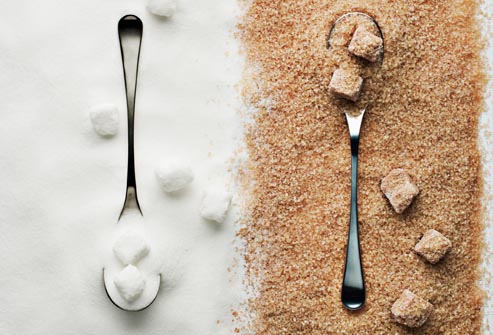|
A friend of mine was asking me about sugar. She wanted to know if she replaced regular ‘table sugar’ with maple syrup, Stevia, agave syrup or coconut sugar would she be making a healthier choice? To use her words, she asked, “How evil is the new-school evil that I am using to replace the old-school evil?”
So, let’s explore the sweet stuff without getting too ‘sciencey’. Table sugar (GI: 65) 383cal/100g Let’s start here and use table sugar as the benchmark for comparisons. Sucrose is made of glucose and fructose molecules. Sucrose is extracted from sugar cane or sugar beets using hot water. It is then concentrated to make syrup which is then crystallized to make the sugar we buy from the shops. In it’s refined ‘sparkly’ white state it’s been heavily processed and the body responds to it as soon as salivary amylase begins to break it down. Beware of a blood sugar spike! Maple Syrup (GI: 54) 306cal/100g Maple syrup is made from the sap of maple trees and is significantly less processed than most other sugars and contains a small amount of minerals (e.g. manganese and zinc). It has a pleasant flavour and a slower release rate to table sugar. Use as a treat to drizzle over your once a month Sunday pancakes! Agave Syrup (GI 15) 314cal/100g Agave syrup is made from sap taken from the leaves of the blue agave plant, which is boiled down. Interestingly, it’s the same plant that makes tequila! It has an intense sweetness, so it would make sense to consume less of it. It has an extremely high fructose content, meaning it is metabolized primarily in the liver and reflecting a lower GI. I suggest if you use this syrup, use less than you would of another sugar. Coconut Sugar (GI 54) 392cal/100g Coconut sugar is a little misleading, as the sugar doesn’t actually come from the coconut. It comes from the sap of a coconut tree. It contains traces of iron, zinc, calcium, potassium and short chain fatty acids. These ‘extras’ can be derived from other food sources in far greater quantities, thus doesn’t sway me towards saying coconut sugar is a ‘healthier’ sugar. Use in moderation in baked goods or occasionally in your hot cocoa. Stevia (GI 0) 2cal/100g Stevia is extracted from the leaves of the Stevia Plant. It has a low GI and almost zero calories, so does this make it the healthiest choice? NO! Stevia is “sweet”, so the body assumes it is receiving sugar and prepares for it. Glucose is cleared from the bloodstream and blood sugars drop, but no real sugar/glucose/carbohydrate is provided to the body to compensate. When this happens, adrenaline and cortisol surge to mobilise sugar from other sources (e.g. liver or muscle glycogen) to bring blood glucose back up. Over consumption of Stevia can really confuse the body, so excessive consumption should come with a caution. Use occasionally in baked goods containing other carbohydrates. BOTTOM LINE: No sugar can really be classed as a healthier option. I suggest using a variety of sugars and always in small quantities. Limiting the sugar you add to foods can make a positive impact on your overall health. Work on ditching all types of sugars and syrups from your tea and coffee and use a range of sugars in your sweat treats. Moderation is such a boring term, but that’s the underlying message. Lisa x
0 Comments
Your comment will be posted after it is approved.
Leave a Reply. |
News FEEDFitness, Energy, Education & Diet Archives
June 2020
Categories
All
|

 RSS Feed
RSS Feed